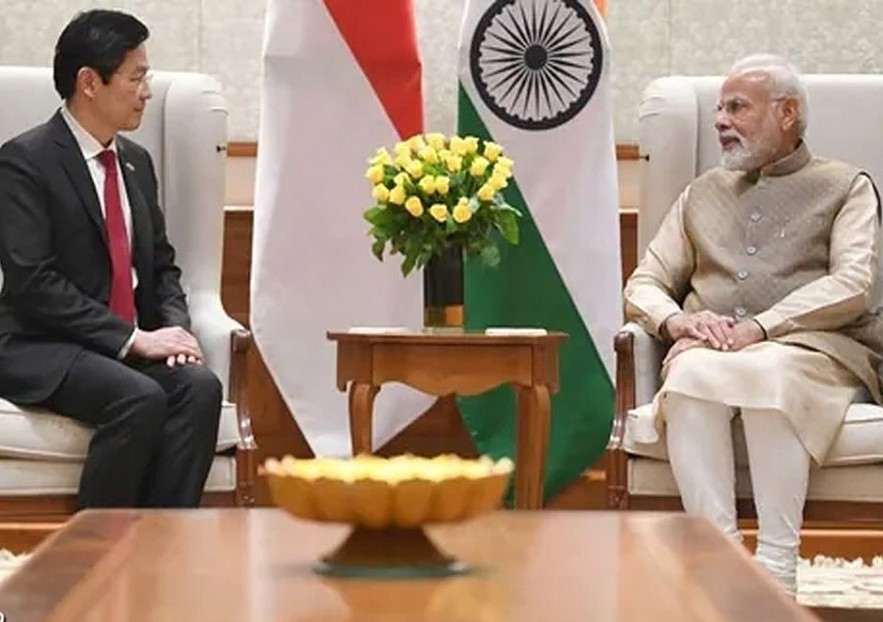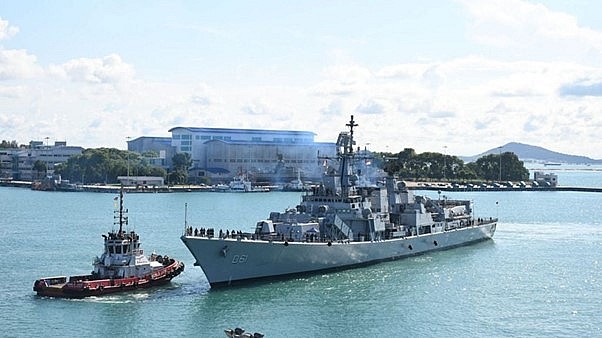India-Singapore Ties poised for Takeoff
 |
Ties with Singapore are historical, and yet today are marked by cooperation in diverse fields encompassing both traditional and non-traditional areas of security. As Prime Minister Modi begins his two-day visit to the island nation, talks to further cooperation in the maritime domain with a focus on security and safety is therefore but natural. The Prime Ministerial visit to Singapore is also aimed at improving diaspora links and to explore the potential for deepening ties. Ahead of the visit, the Ministry of External Affairs (MEA) noted that relations were poised to move to a more intense phase to be built on the new anchors of partnership identified under the India-Singapore Ministerial roundtable framework. Prime Minister Modi is visiting Singapore on 4-5 September at the invitation of Prime Minister Lawrence Wong.
Just how important Singapore is for India and vice versa is illustrated by the visit of a high-level Ministerial team to Singapore at the end of August 2024. Consisting of the Finance Minister, EAM, Commerce Minister and Minister for Railways, the senior Ministers in the Modi cabinet took part in the Second Bilateral Ministerial Roundtable. The Singapore side was represented by an equally high-powered delegation. The subjects discussed demonstrate the focus areas which included digitalization, skills development, sustainability, and healthcare & medicine. Pertinently, both sides recognised the progress made and added two new pillars to the framework for cooperation, namely advanced manufacturing and connectivity to strengthen bilateral cooperation. These issues thus form the bedrock for discussions at the Prime Ministerial level and outcomes are likely to be speedily implemented.
A Prime Ministerial visit to Singapore has been pending for some time as PM Modi visited the island nation in his first term and the Singapore side has been looking forward to having intense discussions and the signing of several MoUs. As mentioned by Secretary (West) MEA, Singapore is India’s largest trading partner in the ASEAN and is a leading source of Foreign Direct Investment (FDI). It is India’s sixth largest trade partner and was the largest source of FDI during the last financial year valued at US$ 11.77 billion. Briefing the media ahead of the visit, Secretary (East) Jaideep Mazumdar indicated that the visit would also give a thrust to cooperation in the field of semiconductors.
PM Modi’s visits to several countries in the recent past have also witnessed an intense outpouring of emotional connect with the diaspora and Singapore will be no exception. Numbering close to 7 lakhs, the diaspora’s presence in Singapore is reflected in ‘Little India’ with its generous sprinkling of shops and temples. The story of the Indian diaspora is thus integral to Singapore’s history. When Sir Stamford Raffles founded Singapore in 1819, he was accompanied by number of Indians employed in various capacities. Subsequently, several Indians arrived first as prisoners, and who later worked on buildings and roads for the empire in Singapore.
What one has witnessed is an evolution of India-Singapore ties and the dynamism in the strategic partnership is evident from the shared history and people-to-people contacts that form an important link between the two countries. Trade and investment flows underpinned by robust defence cooperation and exchanges in culture and education have built a strong foundation and helped to take forward ties in new areas as identified by the India-Singapore Ministerial Roundtable framework. Note that Prime Minister Lawrence Wong has only recently taken over (15 May 2024) the hot seat in Singapore from PM Loong, who held office in Singapore for two decades. In that sense, PM Modi’s visit is “…an opportune time to set the stage for the next stage of our vibrant bilateral relations,” as mentioned by Secretary (East) in the MEA.
The interesting aspect of the visit is that both sides are eager to see the relationship take off to a higher plane and move beyond traditional areas of cooperation such as defence and maritime security. That is why the identification by the Ministerial Roundtable of new areas of bilateral cooperation such as food security, renewables, green hydrogen and semiconductors is significant as there are ‘great complementarities’ bilaterally in these fields. For India, Singapore presents with many options, whether it is in value chains, digital technology, and semiconductors. Potential for high technology exists and could become the ground for fertile cooperation in the years ahead.
 |
A brief survey of the ongoing in the maritime domain shows that Singapore has consistently supported India’s maritime activities in the South China Sea and beyond keeping in mind the sensitivity of the Malacca Straits. Joint naval exercises like Singapore-India Maritime Bilateral Exercise (SIMBEX) and multilateral initiatives in the Indian Ocean have helped to intensify cooperation. SIMBEX was initially focused on anti-submarine warfare, but today covers various dimensions of naval operations, including maritime interdiction, air defence, and coordinated surface and air combat. Notably, both sides hosted the ASEAN-India maritime exercise last year. Bilaterally, the highlight of defence cooperation is an agreement that allows the Indian Navy to use Singapore for logistics support. Such collaboration enhances India’s maritime reach to the South China Sea and marks the importance of this area in bilateral cooperation.
The Prime Ministerial visit is taking place in the backdrop of the 60th anniversary of diplomatic relations to be celebrated in 2025, and the 10th year of the establishment of the strategic partnership with Singapore. It is thus an opportunity to review of the state of bilateral ties and discuss aspects of regional security including the situation in the South China Sea and Myanmar. The significance of the visit lies in the diversity of areas of cooperation and a realisation that Singapore could potentially offer high technology. ‘Little India’ in Singapore is poised to give a boost to bilateral relations like never before.
Recommended
 World
World
India reports 9 Pakistani Aircraft Destroyed In Operation Sindoor Strikes
 World
World
Thailand Positions Itself As a Global Wellness Destination
 World
World
Indonesia Accelerates Procedures to Join OECD
 World
World
South Korea elects Lee Jae-myung president
Popular article
 World
World
22nd Shangri-La Dialogue: Japan, Philippines boost defence cooperation
 World
World
Pakistan NCRC report explores emerging child rights issues
 World
World
"India has right to defend herself against terror," says German Foreign Minister, endorses Op Sindoor
 World
World



